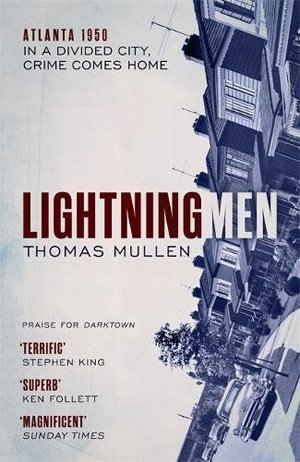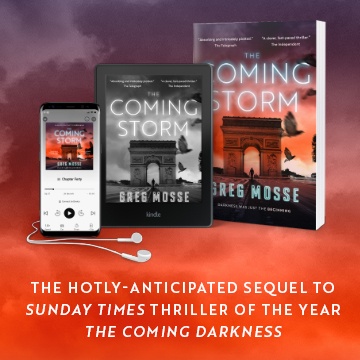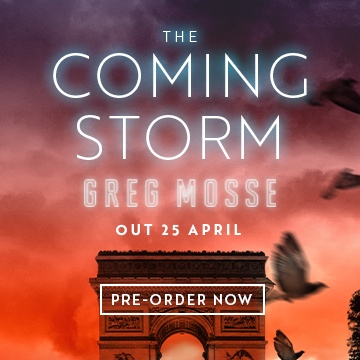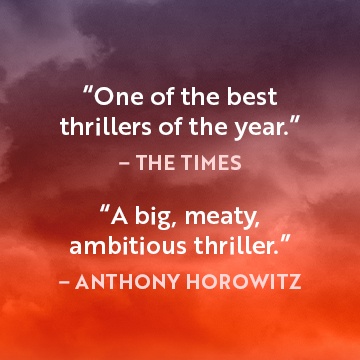 Written by Thoman Mullen — Given the current state of politics in the US and elsewhere, it’s no surprise that race features heavily in some of the recent big crime fiction releases. We loved Thomas Mullen’s Darktown so much that it made not one but two of our book-of-the-year lists in 2016. Lightning Men is the perfect follow up. The sequel stands well on its own, but when read in sequence after Darktown it is even more shocking and urgent.
Written by Thoman Mullen — Given the current state of politics in the US and elsewhere, it’s no surprise that race features heavily in some of the recent big crime fiction releases. We loved Thomas Mullen’s Darktown so much that it made not one but two of our book-of-the-year lists in 2016. Lightning Men is the perfect follow up. The sequel stands well on its own, but when read in sequence after Darktown it is even more shocking and urgent.
Lightning Men opens in 1950, two years after the first book, and Atlanta negro police officers Lucius Boggs and Tommy Smith are still walking the streets of the city’s black neighbourhoods. They aren’t allowed to do a lot of the things they need to in order to do their jobs. They can’t drive squad cars, can’t arrest a white man, can’t interview suspects and can’t gather evidence. Most of the white officers want them gone except their sergeant, who has grown to tolerate them and assists them when he can. The only other white cop on their side is Denny Rakestraw, a half-German World War II hero who has seen the hurt that racism can inflict, and also sees similarities between the fascists he fought in Germany and those putting up signs in certain neighbourhoods telling Negroes to move out. Those signs come complete with SS-style lightning bolts, suggesting that they are only the first step in a much more violent plan to rid Atlanta’s white neighborhoods of African Americans.
With families moving to the city to escape the post-war rural poverty, Atlanta’s historically black neighborhoods are getting overcrowded. The borders between white and black districts are getting more and more vague, and tensions are running high on both sides. Segregation is still law, and the Ku Klux Klan is in its ascendancy, its influence running right up to the Atlanta PD’s top brass despite efforts by the Georgia Bureau of Investigation to stamp out the hate group. Klan membership is seen by many white Georgians as a social obligation rather than something they actively believe in, though some feel that the Klan should be doing more, including Rakestraw’s brother-in-law Dale.
Rakestraw has always felt that Dale played a role in the fire that destroyed a black family’s house in their area, but could never prove it. When Tommy Smith’s sister and brother-in-law move into a traditionally white area, the line between personal and professional becomes blurred. The bricks through the window and threatening letters Smith’s sister receives are ignored by the white police, so Boggs takes it upon himself to do the investigating, despite being out of his jurisdiction. The communities may be segregated, but Smith and Boggs are already aware that crime knows no borders. Some white police will collaborate with negro criminals, as long as they keep the drugs and moonshine in their own area.
Police work also overlaps with the personal for Rakestraw. When Dale sets out to honour a request from a nearby Klan Klavern to put the fear of God into a white man, he finds himself involved in a murder whose significance he does not understand. Rakestraw must find out what happened without treading on anyone’s toes within the Klan or the police. With disparate hate groups creating an atmosphere of violence on the streets of Atlanta, and the white cops openly threatening the jobs and lives of the black cops, there is a sense throughout Lightning Men that an explosion is imminent. And when it comes, it certainly delivers.
Thomas Mullen’s work is always brilliant, but following up a revelation like Darktown is a particular challenge. The sequel delves a little deeper into the private lives of both the black and white officers, and builds on the sense of hopelessness and desperation felt in Darktown. Changes in race relations are always incremental, a series of small victories, all met with intense opposition. There is still more to be done, just as it feels there’s always going to more pushback against the Atlanta PD’s negro officers, so there is plenty of room for Thomas Mullen to continue expanding this series.
Lightning Men does have its difficult moments. The sheer number and variety of different terms for African Americans, including a smattering of the n-word, will make it difficult reading for some. It’s not gratuitous, and it’s not overdone or Tarantino-esque. Instead, the language feels genuine and a good representation of the time. Readers with their own experiences of racism may find parts of Lightning Men painful, but at the same time this book is both shocking and horrifically timely.
For another recent look at current race relations in the American South, try Bluebird, Bluebird by Attica Locke.
Simon & Schuster
Print/Kindle/iBook
£5.99
CFL Rating: 5 Stars










